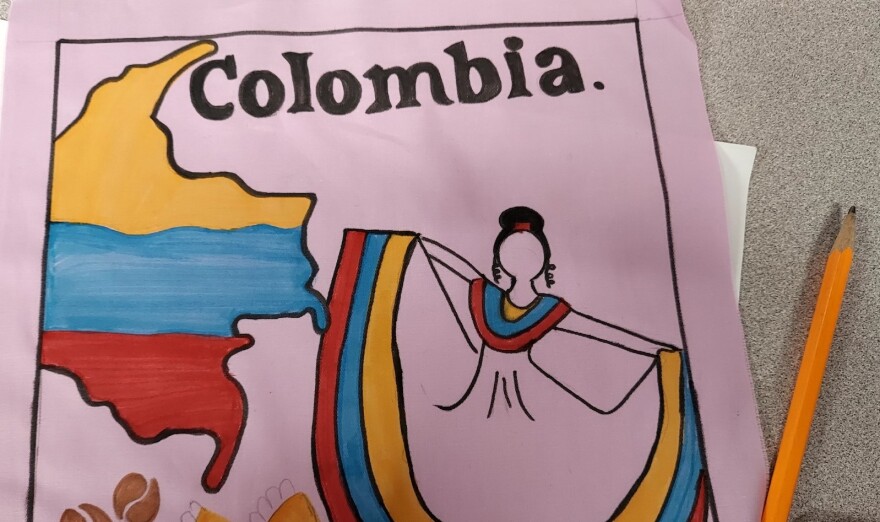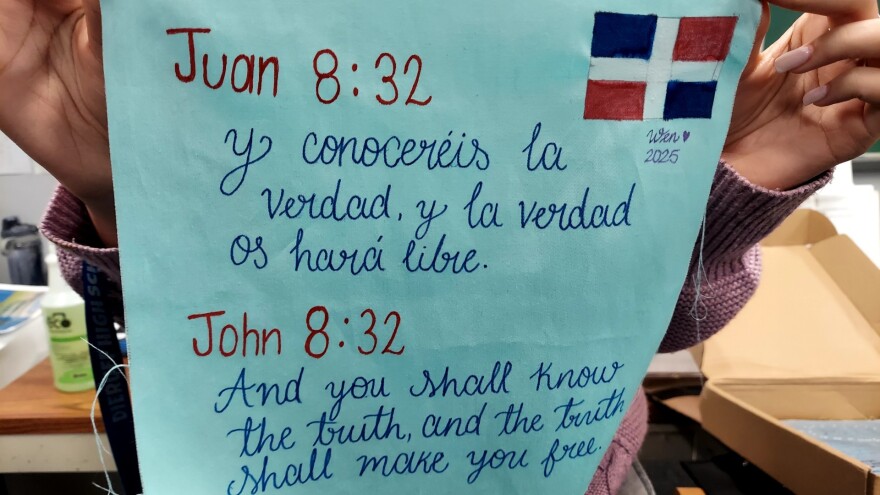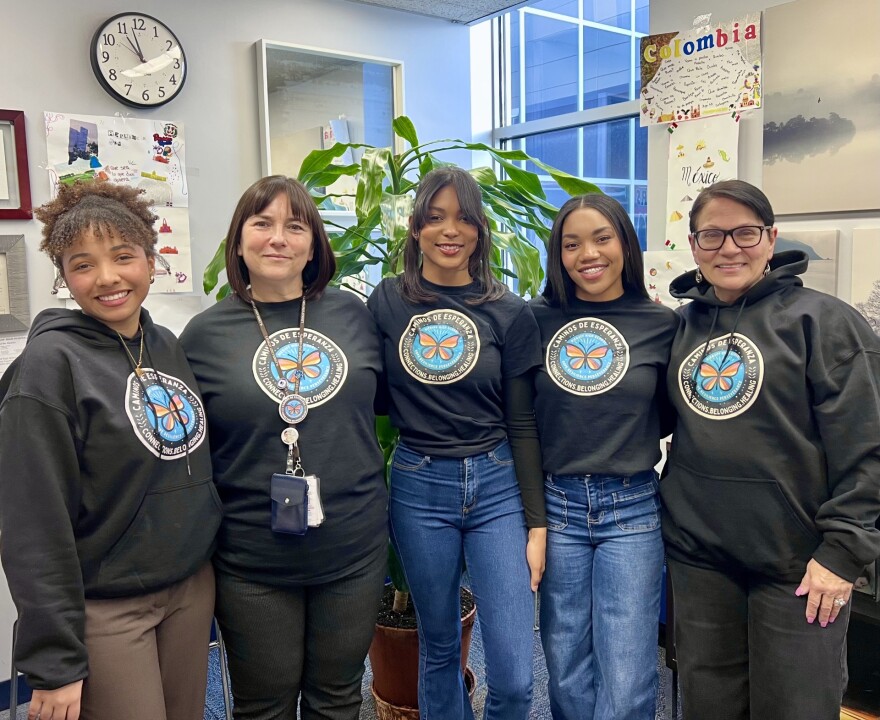ALLENTOWN, Pa. — When Yeisse Jimenez first moved to Allentown from the Dominican Republic three years ago, nearly everything was a challenge — making friends, learning English, adjusting to American culture.
Jimenez struggled to fit in at Dieruff High School. But with determination and perseverance, she slowly found her way.
Now a 17-year-old senior, Jimenez is in multiple honors societies and leads the school’s multicultural club. She also recently earned a full-ride scholarship to attend East Stroudsburg University in the fall to major in pre-law.
“We are helping them to feel more comfortable, not only within the environment, but with themselves. It’s a really tough process.”Yeisse Jimenez, Dieruff High School senior
Throughout her final year at Dieruff, Jimenez has worked to make sure other immigrant students find similar success by mentoring them through Caminos de Esperanza, a program for the high school’s newcomer population.
Caminos de Esperanza, which translates to “Roads of Hope” in English, is a peer mentoring and counseling group that offers a space for immigrant students to learn English, make friends and process trauma.
Jimenez and five other mentors meet weekly during the school day with 28 mentees, who recently immigrated to the United States from countries such as Venezuela, Colombia, Spain, Peru, Puerto Rico and the Dominican Republic.
All the students are native Spanish speakers.
“We are helping them to feel more comfortable, not only within the environment, but with themselves,” Jimenez said. “It’s a really tough process.”
Additional support for newcomers
Caminos de Esperanza was developed this school year by Jimenez and other mentors who also are immigrants.
They came up with the idea after learning Allentown School District’s Newcomer Academy was being shut down after the 2023-24 academic year.
Last spring, the district announced new immigrant students would go directly to their neighborhood schools and receive support services there instead of attending the academy.
ASD made the decision because it was cited for inequitably serving immigrant students, keeping them at Newcomer Academy for years, instead of on a short-term basis.
That format was out of compliance with state law and federal guidelines.
As a result, Dieruff students formed Caminos de Esperanza to serve as a space for both new immigrant students and those who had already been in the United States but attended Newcomer Academy in past years.
Caminos de Esperanza serves as an additional support system for Dieruff’s immigrant students, supplementing ASD’s newcomer programming that’s now administered at the high school.

Mentors such as Jimenez help immigrant students with their homework and encourage them to join clubs. They also serve as advocates for students who encounter a language barrier when trying to talk to their English-speaking teachers.
“There’s a lot of students [who] don’t know English very well, and we try to help them,” Jimenez said. “It’s difficult to learn a new language.”
While immigrant students take classes specifically for English language learners, there can be the temptation to speak in Spanish when all of your classmates know the language, Jimenez said.
That’s why she encourages mentees to work on their English, and Caminos de Esperanza provides them with a safe space to practice.
Ultimately, the group offers “connections, belonging and healing” to both mentees and mentors, Jimenez said.
Mentorship has positive impacts
Because mentors have been in the United States for the past few years, they can both guide new immigrant students and easily relate to their struggles.
“I consider this more healing myself from all the things that I went through,” Jimenez said.
"These are students that are kind, they’re selfless, they know the struggles of navigating a new culture."Beatriz Gambourg-Schuster, Dieruff High School guidance counselor
Dieruff guidance counselor Beatriz Gambourg-Schuster, the staff leader of Caminos de Esperanza, said she’s proud of Jimenez and the group’s other mentors for their efforts.
“These are students that are kind, they’re selfless, they know the struggles of navigating a new culture,” Gambourg-Schuster said.
And the mentors’ efforts have a real payoff, she said.
For one, helping new immigrant students navigate school and make friends results in improved school attendance, she said.
Additionally, a survey of student participants showed mentees don’t feel as isolated since joining the group.
“We can see the social and emotional impact of the program,” she said. “It’s not only to help with English, it's really to help with self-esteem [and] confidence.”
Because of the program’s success, Dieruff plans to continue Caminos de Esperanza next year.
Gambourg-Schuster also is helping ASD’s Sonia Sotomayor Dual Language Immersion Academy develop a similar program for younger students.
Immigrant teens face similar struggles
“The issues that immigrants face are unique to that population,” Gambourg-Schuster said.
That’s why it’s essential for immigrant students to have a safe space to share what’s on their minds, she said.
“The conversation will gravitate toward feeling isolated, relocation, missing their families,” Gambourg-Schuster said.
Though Caminos de Esperanza was formed before the 2024 presidential election, it turned out to be a “good coincidence,” Gambourg-Schuster added.
President Donald Trump’s administration has cracked down on immigration in unprecedented ways. That’s left many students and families feeling unsafe and afraid, and students’ mental health has inevitably been affected, Gambourg-Schuster said.
“A lot of them, I can say they are my friends now."Dieruff senior Wendy Rodriguez
The tense national climate coupled with the individual trauma that impacts immigrants has made Caminos de Esperanza’s work indispensable.
But mentoring is not enough, Gambourg-Schuster said.
“You have to have a therapeutic intervention,” she said.
Gambourg-Schuster works with a therapist who partners with ASD to make sure student activities are trauma-informed.
Many of them are crafts that get students talking to each other during the process.
“Art therapy works,” Gambourg-Schuster said. “You’re having a conversation about things that matter to them.”

The students have decorated fabric tiles for a quilt and colored paper versions of their home countries' flags.
Wenly Rodriguez, a mentor in the program, said her favorite art activity was making a collage to pay homage to the Dominican Republic, where she’s originally from.
Her peers did the same to celebrate their homelands, and they all learned about each other’s backgrounds in the process.
“We started talking about our culture and stuff that we have in common and things that we have different,” Rodriguez, an 18-year-old Dieruff senior, said.
“A lot of them, I can say they are my friends now."
Mentors share immigration stories
Loreline Carmona, a 19-year-old Dieruff senior, said her favorite part of being a mentor for Caminos de Esperanza has been sharing her own story.
Carmona moved to the United States in 2023 from Spain. One of her biggest struggles was making friends, she said.
“I don’t like to meet people, I’m shy, but I like sports,” she said.
“It was hard, but I never gave up."Loreline Carmona, Dieff High School senior
Carmona joined Dieruff’s basketball and track teams, and she slowly made friends that way — but it wasn’t easy.
Though some of her teammates would invite her on excursions outside of school, she still struggled to communicate with them because she didn’t know English well enough yet, she said.
So Carmona dedicated the next year to honing her language skills by watching TV and reading books in English, she said.
“It was hard, but I never gave up,” Carmona said.
Yahelis Feliz, a mentor and 18-year-old Dieruff senior, also said it was difficult to make friends when she first moved to the United States from the Dominican Republic two years ago.
She believes Caminos de Esperanza can lessen that burden for new immigrant students moving forward.
“I’m happy that they have the help that we needed in that time,” she said. “We’re helping them, and they’re helping us, too — to grow and to be more mature and to understand things more.”
Feliz said her favorite part of being a mentor has been seeing her own growth.
“I have social anxiety, and I’m surprised by myself [at] how I have helped so much, when I am the one who needs help,” she said.
“We’re helping them, [and] we’re helping each other.”
Students interested in being mentors next year must be bilingual and have some experience with immigration. They can contact staff lead Gambourg-Schuster to learn more.


